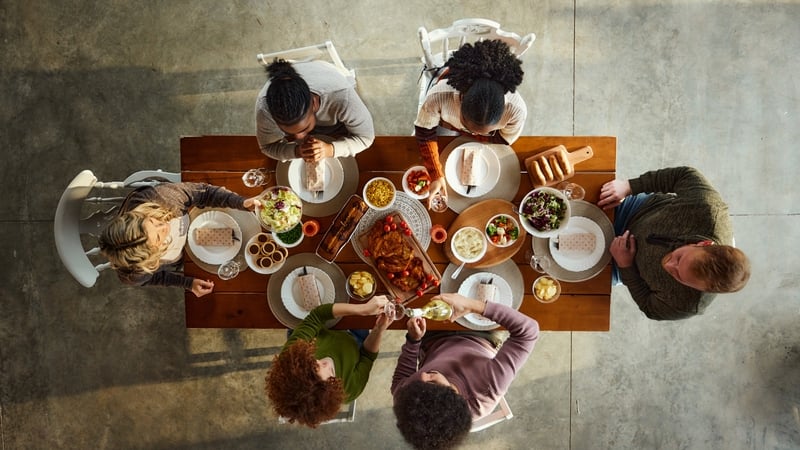Sarah Garvey dared to dine with five strangers. Here, she reviews the memorable experience and the app behind it.
A few weeks ago, I was productively doom-scrolling at 1am when I came across a garish, neon Instagram ad from an app telling me it had an all-knowing algorithm that would match me with five strangers for dinner in a mystery location.
'HAVE DINNER WITH STRANGERS TONIGHT', it screamed.
"That sounds like a nightmare. Who in their right mind would do that?", I thought, and scrolled past. A week later, I sat down to dinner with five strangers.
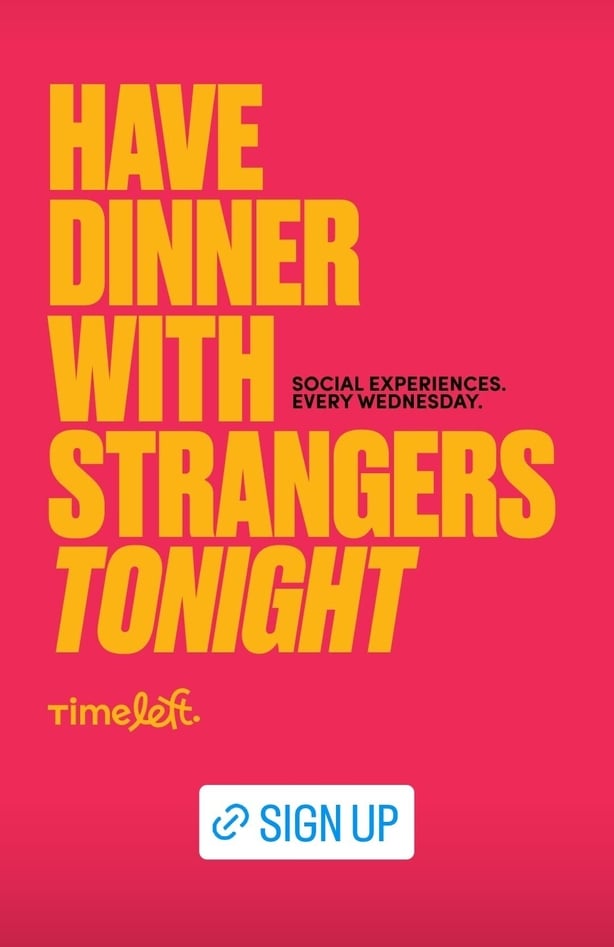
TimeLeft, the ominously named French meetup app, which has recently expanded to several greyer European countries, claims to group like-minded people together for dinner, in a bid to help users expand their social circles.
Though not a dating app per se, a chunk of its marketing is aimed at the single-and-looking market, presenting itself as an alternative to the apps.
As a dating app user who feels like they have a part-time admin job writing messages to men who - despite chorusing "ask me anything" on their profiles - respond like they’re paying by the word to advertise their car in the Classifieds, I fall into this market.
With a dwindling social group due to friends settling down and moving out of the city, I - like many others - was faced with the gross indignity of meeting new people. Or the frightening reality that I might have to get into tag rugby.
I'm 34 but have the back of a 60-year-old, so rugby could prove fatal. TimeLeft, it is.
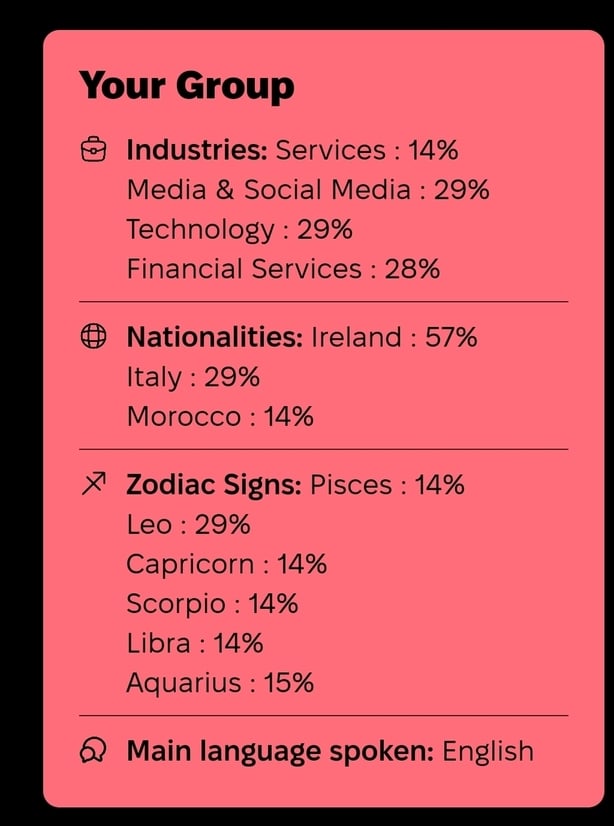
So, how does it work?
Users fill out a lengthy questionnaire when registering, asking basic questions like what kind of price range you are comfortable with when it comes to the dinners and some broad stroke personality questions, like: "On a scale from 1 to 10, how important is religion to you?".
More cryptic questions sneak through too, like: "If your life was a fashion statement, would it be classic and timeless, or trendy and expensive?". Questions like this did make me worry that I would be surrounded by people who genuinely enjoy work meetings where everyone shares a "fun fact".
Once registered, you can choose a date you want to join a dinner (always on Wednesdays). You find out the location of the restaurant the morning-of, and get a limited infographic about your fellow diners the night before, with nationalities, professional categories, and – more bafflingly – star signs.
The promotional videos featured a lot of cool Barcelonans cycling to their dinners in wide-legged trousers, drinking reasonably priced wine and seemingly totally at ease with committing to three hours with strangers. How would the Irish version fare in comparison?
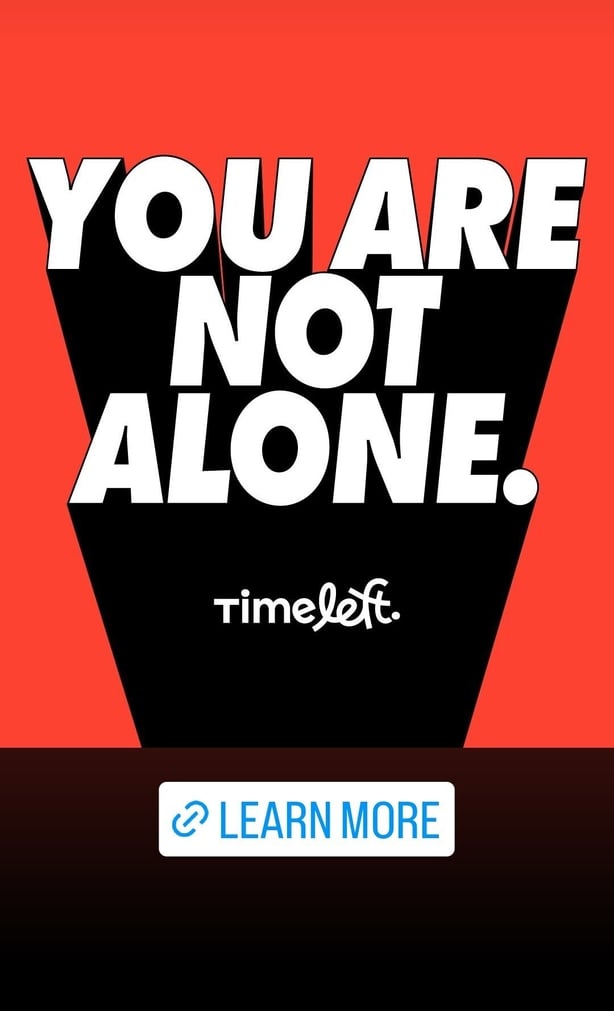
Three weeks ago, I approached the front desk of a Dublin-city restaurant, worrying that meeting total strangers (no names, barely any background information) might be unwise.
"Hi, I'm here for the dinner that will soon be featured on a true crime series", I muttered as the waiter took my coat.
I had read in some reviews that the conversation had gotten very deep, with people talking about their childhood trauma and deepest hopes and fears. As an Irish person, this instinctively makes me want to crawl out of my skin. Which would, in fairness, be a new trauma for my dinner mates to discuss.
Thankfully, at my first dinner, we avoided this trope. The night was – dare I say – pleasant. Conversation flowed well, everyone was mindful of not dominating the conversation too much and letting everyone get involved. The food was good and despite getting suckered into spending €18.50 for a single glass of wine (a new personal record which will haunt me for the rest of my life) the evening went off without a hitch.
Top tip: Don’t take a blind recommendation from the sommelier to seem cool and laidback in front of your new stranger-friends.
Everyone at the dinner was engaging and unnervingly attractive, and I was quickly visited by the certainty that I was the most boring person at the table. The other women were giving off a "Miss Universe" kind of energy, whereas I was definitely more "Calor Housewife of the Year".
The marketing makes a big deal of a "game" that unlocks in the app when your dinner starts, and we eagerly checked the app to see what it had in store for us. The game is, in fact, a series of ice-breaker questions, which we didn't refer to that much.
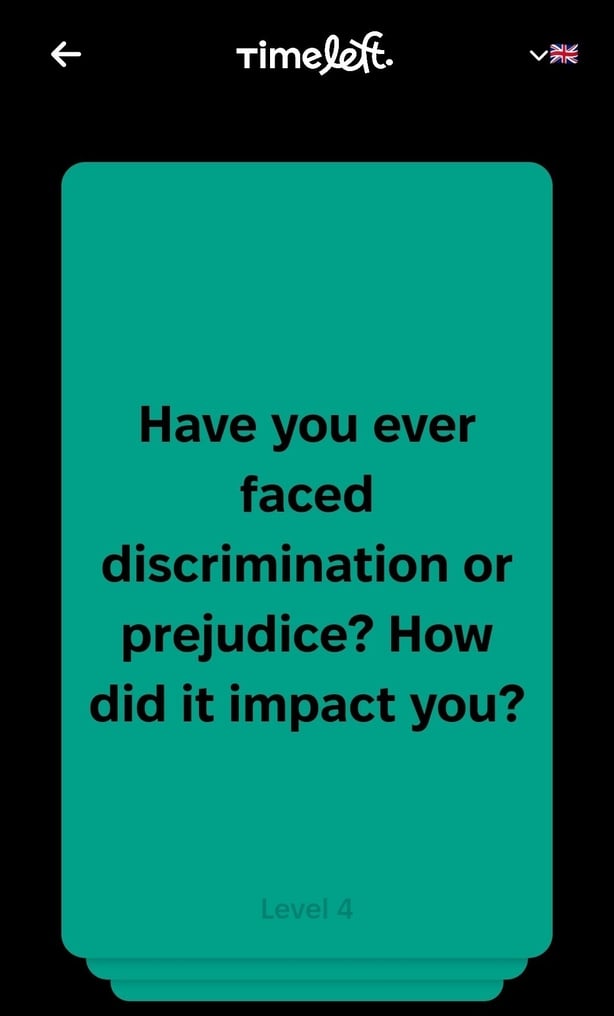
High off the success of Dinner 1, I signed up for another dinner the next week. As people arrived and we started making small talk, things looked promising. We were getting on well; it started to feel like we were old friends. We waited a while for the sixth diner, before deciding she must not be coming.
Half an hour later, a woman materialised at the table, desperately and unapologetically late. The introduction of a new person into our fragile ecosystem put the brakes on proceedings. We were forced to reset, introducing ourselves again for the benefit of the new arrival, treading old ground.
As one diner shared a story about some training courses they’d been doing, the new arrival declared, "You’ve said enough. I don’t want to listen to this".
My polite Irish DNA felt like it had started to implode on itself.
What followed was a dinner so challenging, that at one point I realised I had started to massage my own shoulders as a stress response. Every time the new arrival slapped down an earnest question from someone or took a phone call while sitting at the table, the rest of us tried to get the conversation back on track. Another dinner mate broke out the ice-breaker questions, which helped give structure to the conversation, until I realised they were determined to get through every last one of them.
My cockiness about my dinners not falling into uncomfortably deep conversation had come back to haunt me. I found myself answering questions like: "What are three red flags when it comes to dating you?", "Can you share a time when you felt a significant personal failure?", "When was the last time you were a bad friend?", which were somewhat comedically interspersed with "What is your favourite book?" and other, less intrusive prompts.
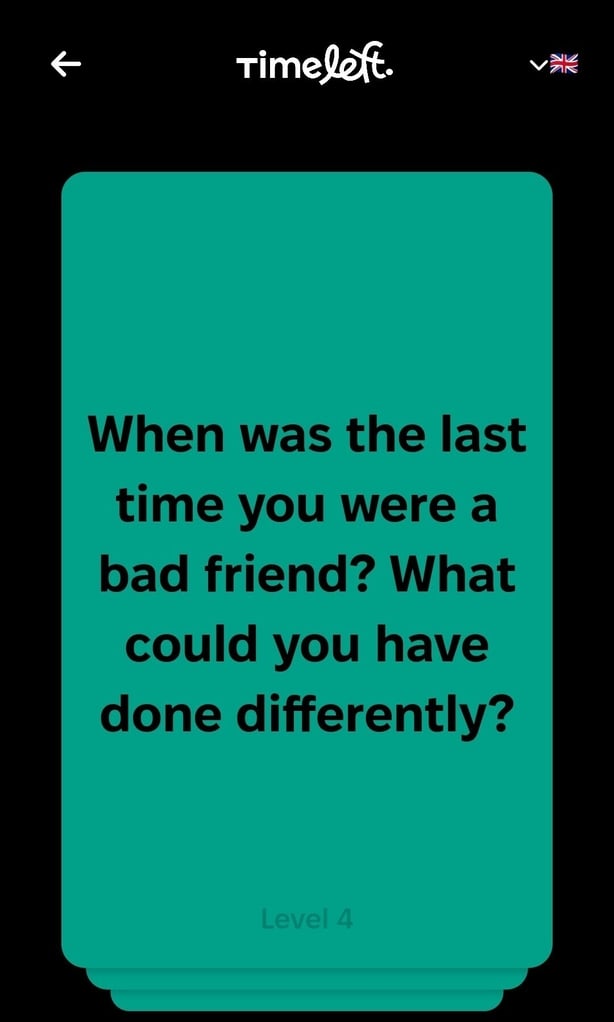
I contorted myself into a cross-legged, cross-armed position for optimal self-defense, as the new arrival pitched podcast ideas to me. Despite trying to keep a neutral-yet-interested expression on my face, I feared my eyebrows were rising beyond my control. The person asking the ice-breaker questions carried on with dogged determination, clinging to societal decorum like Jack clinging to the life raft from the Titanic.
By the end of Dinner 2, we had been at the table for four hours (it takes a while for six people to answer dozens of ice-breaker questions), and I was a shell of a human being. While the Dinner 1 gang had loitered around and exchanged contact information, this time around we practically sprinted away from each other while saying goodnight. I walked home staring at the sky, like that photo of Nicole Kidman on the day of her divorce, experiencing the sweet release of freedom.
As I had signed up for a monthly subscription, I decided to give Dinner 3 a chance, which turned out to be the perfect cure for the trials of Dinner 2. It was a mercifully pleasant evening with good company, more good food (the app only books restaurants with high Tripadvisor scores) and some interesting stories.
I've started using an app where you meet 5 strangers for dinner every week and last week, I sent a voice note to 1 friend telling her how it went. This week, the requests for voice note updates have grown to 5 people and I may have unintentionally started a very limited podcast.
— Sarah Garvey (@ItsSarahGarvey) February 28, 2024
Would I recommend TimeLeft?
Yes, absolutely. I met a handful of people I would meet again for drinks or events and got to try some new restaurants. It’s also interesting from a social dynamics point of view, to go to a dinner where nobody knows anyone and there is no anchor.
In terms of demographic breakdown, it’s largely people in their 30s, with a ratio of about three women for every man. It’s about 40% Irish, 60% non-Irish and seems to attract a lot of tech workers.
The nitty-gritty
TimeLeft is currently available in Dublin, with plans to expand to other cities. It’s a subscription model, with monthly (€19.99 per month), quarterly (€49.99 every three months) or half-yearly (€69.99 every six months) options.
The cost of dinner is not included. After dinner, you can connect with the people you met at dinner in-app. More information available at timeleft.com.
